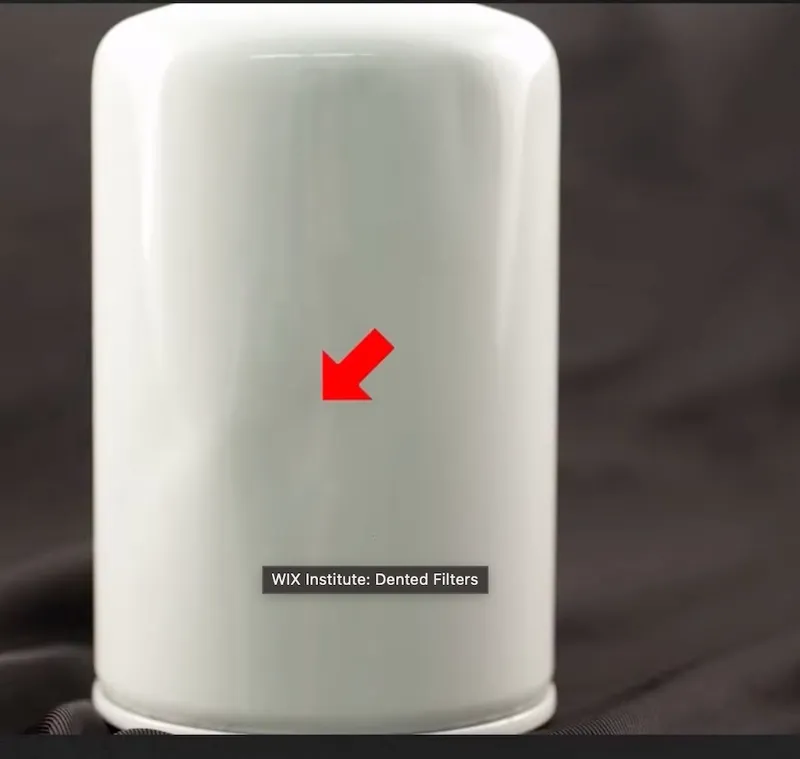🎁 FREE LIGHTED MULTI-TOOL with $100 Order • Code: MULTI226 • Learn More →
Why a Small Dent Can Cause Big Problems for Your Filter

According to the experts at the WIX Institute of Filtration Technology, it absolutely does. A dent can lead to frustrating and potentially costly failures down the road.
Since 1939, WIX® Filters has been an innovator in filtration products. WIX designs, manufactures and distributes products for automotive, diesel, agricultural, industrial and specialty filter markets. Its product line includes oil, air, cabin interior, fuel, coolant, transmission and hydraulic filters for automobiles, trucks, off-road equipment and manufacturing applications.
This informative video by WIX Filters breaks down the science behind why dented filters are a risk.
Here’s the gist:
-
Pressure Pulses are Normal: Engines and fuel systems don’t deliver fluids (like oil or fuel) in a perfectly smooth stream. Pumps create constant pressure pulses or surges as they operate.
-
Filters Are Designed for Even Stress: Filter canisters are engineered to withstand these pulses by distributing the pressure evenly across their surface.
-
Dents Create Weak Spots: When a filter canister gets dented – whether from being dropped before installation or damaged by improper tool use – it creates a localized stress concentration point. The smooth distribution of pressure is disrupted.
-
Metal Fatigue Sets In: At the site of the dent, the metal flexes slightly with each pressure pulse from the system. Over time, this constant flexing weakens the metal, causing metal fatigue. Smaller, sharper dents can often concentrate this stress even more effectively than larger ones.
-
Crack! Failure Occurs: Eventually, the fatigued metal cracks, leading to leaks (a fatigue fracture). This means the filter is no longer doing its job and could potentially lead to fluid loss or engine damage.
-
Never Install a Dented Filter: If a filter is dropped or dented before installation, don’t use it.
-
Install by Hand: Most spin-on filters are designed for hand-tightening. This is the best way to avoid accidental denting with tools.
-
Use Wrenches Properly (If Necessary): Filter wrenches are primarily for removal. If you absolutely must use one for installation, grip the strongest part of the filter – the very bottom near the baseplate – never the middle section of the can, which is more susceptible to crushing or denting. Avoid over-torquing.
-
Replace Dented Filters Immediately: If you notice a dent on an already installed filter (perhaps from road debris or other impact), replace it as soon as possible to prevent leaks and potential system damage.
In short, careful handling and proper installation techniques are crucial for ensuring your filters perform reliably and protect your engine. That seemingly minor dent is a failure waiting to happen.

*All trademarked names and images are the property of their respective owners and may be registered marks in some countries. No affiliation or endorsement claim, express or implied, is made by their use.
Do you want to become an AMSOIL Preferred Customer?
Let’s do this. Simple as can be!
Become an AMSOIL Preferred Customer Today!
BUY AMSOIL PRODUCTS WITH EASE!
At National Synthetics we’ve been providing superior AMSOIL Products & services to our customers for over a decade.
Please reach out to us if we can answer any questions or help you with AMSOIL products.
Protect Your Engine with AMSOIL
Experience the difference premium synthetic lubricants make. Shop with confidence through your authorized AMSOIL dealer.
Browse AMSOIL Products

